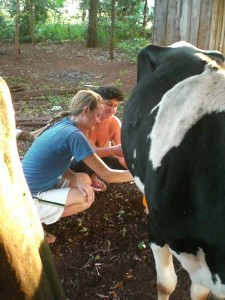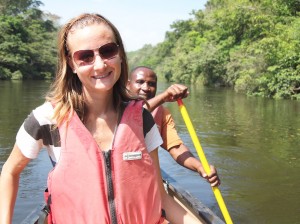Posts Tagged "freelance travel writing"
How I got started in freelance travel writing
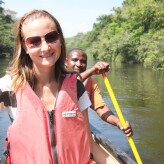
In 5th grade, a travel writer came to visit my class in rural Wisconsin. He talked about spending francs in Paris and exotic Africa. Some of my classmates seemed bored, longing for recess, but I was enthralled. Better still, he was paid to write about his experiences. I’d never heard the term travel writer before that day. To me, it was a small miracle that such a career even existed. I vowed I would grow up and become a travel writer. Of course, reality and fear eventually kicked in around high school. I pushed aside the idea of travel writing as a childhood dream, something only a few lucky people could do. I went to college to study social work and considered myself fortunate that I’d been able to study abroad twice.
Fate intervened. Before graduation, I rekindled another forgotten childhood dream: The Peace Corps. Without my social work degree, I never would have been accepted and sent for two years to work with youth in Paraguay.
Long term volunteering abroad
Peace Corps was where I began to hone all the skills I now rely on as a “professional traveler”. Beyond learning Spanish and a few swear words in the indigenous language of Guarani, I figured out that people in other countries aren’t dangerous. I learned to stay in strangers’ homes, eat their food, and talk to them. I figured out how to use public transportation, deal with stomach upsets, and prevent my stuff from being stolen. I learned that even when the worst things happen, (like the time I got diarrhea in prison), I could bounce back and turn it all into a great story. I got used to being homesick, expecting the unexpected, and going with the flow. I searched out the unusual and the overlooked because that is where all the good stories are.
Travel writing began to creep back into my consciousness. But fear still reigned. I would never be a good enough writer. I was a good traveler; I had proved that in Peace Corps and then on a subsequent trip to Southeast Asia and China. But maybe, just maybe, I could write a travel memoir about Peace Corps and Paraguay?
Learning to write about my travels
I did a surreptitious Google search for “travel writing courses” and came across MatadorU, a program offered by the publishers of Matador Network, one of the largest travel magazines. The more I researched the program, the more I liked it. MatadorU was backed by National Geographic Traveler and had laid the courses out in an approachable way. It looked like I could take the course from anywhere in the world, which was good, because I was finished with Peace Corps and essentially homeless. I’d been accepted to a graduate program for social work in New York City, but wasn’t sure I wanted to go. Again I had to choose between pursuing my dream of becoming a travel writer, or relinquishing it in favor of a safer, more conventional path.
I signed up for MatadorU thinking I could learn a lot about travel writing for my book before proceeding to grad school, without any plans for trying to become a freelance writer. The first thing I had to do for MatadorU was set up a WordPress blog. I loved how easy this new platform was, but I was so terrified of someone stumbling upon my (bad) writing that I used a fake name, “Mega Woo”. With each week’s lesson, my skills – and confidence – began to grow. I wrote a piece about being married in the Peace Corps and was absolutely shocked when a Matador editor emailed me and offered to buy the piece for Matador. A few weeks later I was invited on a press trip in Cabos, Mexico. Then I sold another piece. I was doing it, I was travel writing!
Ever wish you had a good friend who was already established as a travel writer, and could show you the ropes and introduce you to the editors, press agents, and publishers you’d need to know to succeed?
 Matador Networks’ Travel Writing Program is run by one of the largest travel publishing companies—the very same companies you’ll need to pitch to launch your career.
Matador Networks’ Travel Writing Program is run by one of the largest travel publishing companies—the very same companies you’ll need to pitch to launch your career.
Unsurprising then that some of the most successful travel writers got their start studying with this course. It will teach you everything you need to know to launch your career as a travel writer. But more importantly, the contacts you make there will open doors to getting those all-important first published bylines.
Becoming an official freelance travel writer
But I still had that pesky graduate school admission to think of. I moved to New York City and found a walk-up on the Lower East Side. I sat in my window every night until three, writing. I went to the grad school orientation and looked over my class list, but my heart wasn’t in it. I contacted the school and deferred my application. Then I told my parents. They weren’t surprised. Neither was I. I started pitching like mad, realizing I wouldn’t be able to count on student loans to pay my rent. I had to take jobs babysitting and work as a coat check attendant. I didn’t care. I was completely free to do what I wanted for the first time in my adult life. The 5th grader inside of me was so proud.
Still, the 27 year-old with the student loans and Manhattan rent was a little nervous. And occasionally a little voice would ask, ‘who do you think you are?’ I ignored it. I went to the New York Times Travel show with an editor from MatadorU and met the publicists who worked with the Belize Tourism Board. I was on a short list to become a writer-in-residence in Belize. The publicists were very impressed with my Peace Corps experiences. A week later, I signed the contract. I’d be traveling in Belize for three months and writing about my experiences. I found a subletter for my apartment, packed a backpack, and tracked down that travel writer who’d inspired me in 5th grade. I owed him a huge thank you.
Read MoreFreelance travel writing as a career

A career in freelance travel writing might lead you into writing copy for travel-related websites, contributing to destination guides, producing features for magazines or newspapers, reviewing tourist attractions or hotels or even creating a whole book about your experiences. In short, it’s a career that’s as varied as you want to make it.
Most writers start by generating online content, as there is so much more demand. However, as you build up your portfolio over time, you may be able to move into the more lucrative print market.
But can you really make a career out of freelance travel writing, and what will it involve? Well, let’s see.
Going it alone
There’s no doubt about it, working as a freelancer in travel journalism can be as tough as it is rewarding. You’ll need confidence in your writing ability and plenty of perseverance to get through the first few months but, over time, you’ll build up a network of contacts and long-term sources of work that will make you feel more secure. If you have to pin motivational quotes above your desk then so be it!
A career break spent abroad or long term travel plans can be a great springboard into careers in travel writing. Doing it this way can feel much less scary than just quitting your job and starting to look for freelance work. You can spend time researching and writing articles while you travel, and start to build up a portfolio before you return – if you plan to come home, that is.
Finding freelance writing jobs
Your freelance travel writing career is what you choose to make of it. Spend time looking online to get an idea of all the types of jobs out there. Think about what you’d most like to do and where you’d really love to see your writing published. Your dream might be to get a full length feature on a subject of your choice published in Conde Nast Traveller, so keep that in the back of your mind as you go. You might not be able to achieve it straightaway but there’s no reason why you can’t make it happen. It’s important to be ambitious and have a goal in mind for your freelance travel writing.
Across all the different sorts of travel journalism, you’ll get to work with lots of different people including editors, other copywriters, public relations staff, as well as all the interesting people you’ll interview for your articles. You might even end up with your own literary agent and publisher.
Read more about the nuts and bolts of finding work in our other article, The five rules of finding travel writing jobs.
Choosing the right path
There is no set path into becoming a freelance travel writer. Some people work their way up in a magazine, others start their own travel blog and get scouted by a publisher and others publish articles in lots of different places throughout their careers. So the good news is that as long as you’re writing, you can’t really go wrong when it comes to career progression.
And there are anough challenges to keep you going over the years. Keep setting yourself ever-evolving goals and you’ll always be achieving new things.
Funding your next adventure
Aspiring travel writers often ask how much money they’re likely to earn. Unsurprisingly, the answer is that potential salary varies…
If you want a freelance travel writing career, we’ll hazard a guess that you’re probably more keen to see the world than living the good life at home. You might dream of spending years travelling through India, writing as you go, in which case you’ll hardly need any cash to live comfortably. If you plan to work from home however, you’ll have to think about how much you’ll need to pay your living costs and fund the lifestyle that makes you happy.
Careers in travel writing can certainly earn you a good living, and travel journalism can be quite lucrative, but it’s worth realising up front that it’s unlikely to buy you a luxury sports car or a countryside mansion.
You’ll have to set your own rates, usually by the hour or per word. Work out how much you can write in an hour – including research and editing time – and decide what you think would be a reasonable rate. If you’re just starting out, your fee will have to reflect your experience, but as time goes on and you win more work, you’ll be able to start charging more.
A little bit on the side
If you’re savvy, there can be perks. Many travel writers manage to get holidays, weekend breaks and meals out at some of the best restaurants for free in exchange for a bit of PR. If you’re clever, you can then make money on top by then selling articles about your experience. However, such work trips are relatively unusual these days and should not be your sole motivation for a career in freelance travel writing.
So, before you declare your passion for travel writing and throw in the towel at your existing job, think carefully about whether it will allow you to live the life you truly want.
Read MoreFreelance Travel Writing Gear: my top 10 must-haves
Once, while sitting by the river and working on my laptop at an eco-lodge in Belize, another guest approached me and said, “Travel writing must be the life – you get paid to vacation and they buy you a free laptop.” There are a few things wrong with his sentence, but the one I’ll focus on here is the “free” laptop. Freelance writers aren’t given the equipment we need to do our job. We buy it ourselves and haul it with us wherever we end up going: camel riding in Morocco, practicing yoga in Mexico, or scuba diving in Belize.
Price is a major factor in deciding what I need to buy, but durability, weight, and multi-functionality matter too. The trick is to invest in gear from the States that I can’t easily find in foreign countries. Notebooks, memory cards, and toiletries are available all over the world, but my core list of crucial items were bought before I got on the plane. Here is a list of must haves to bring with me when I travel.
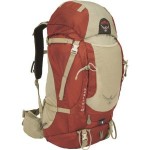 Backpack: Osprey Kestrel
Backpack: Osprey Kestrel
Osprey bags are well known for their durability, which was extra important when I had to carry my entire life on my back while I travelled throughout Belize for three months. Rips, tears, or broken zippers weren’t an option – and they weren’t an issue.
 Digital Camera: Olympus PEN E-P1
Digital Camera: Olympus PEN E-P1
What makes the Olympus PEN E-P1 camera the best bet for travel writers is that the camera body is lightweight and discreet, but still takes beautiful photos. The extended battery life allowed me to shoot hours of HD video and hundreds of still shots in Belize’s Mayan villages with zero access to electricity.
 Laptop Computer: Apple MacBook Air
Laptop Computer: Apple MacBook Air
I’m a firm believer that anything I take with me on a trip has a good chance of not coming home with me. I proved I’m okay with that when I left my iPhone in Morocco. But if anything were to happen to my MacBook Air, I’d be devastated, and not just because of its high price tag. As a blogger, my light as air MacBook Air is my business partner and best friend. For me, the cost is justified because I don’t get a sore shoulder from lugging a bulky computer everywhere, and the MacBook Air is lightning fast, which saves me time.
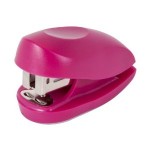 Mini Stapler
Mini Stapler
While in Morocco, I collected hundreds of business cards, menus, flyers, receipts, and promotional materials because that information becomes vital when writing articles after the trip. The easiest way to organize all that loose paper is to simply staple it into a notebook. Voila. Organized.
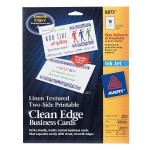 Business Cards
Business Cards
I wish I’d printed out business cards earlier in my career. Having my name, contact information, and website on one little card is much more professional and organized than scribbling on a scrap of paper. In Latin America especially, business cards are a requirement. Not having one reads as amateur. Exchanging cards with anyone from hotel owners to interview subjects is as necessary as a handshake, mostly for formality.
 Smartphone: Apple iPhone
Smartphone: Apple iPhone
A smartphone is like a miniature laptop that fits in my pocket. When I’m traveling I can quickly access travel apps and email, and take photos for my social media platforms. In New York City, I use it constantly to navigate the subway system. Oh, and that Starbucks app? Perfect for finding the nearest free bathroom.
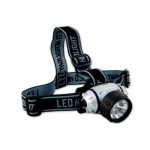 Headlamp
Headlamp
Headlamps are the ultimate hands-free device. In Paraguay, I used my headlamp every night on my way to the dark latrine. In Belize, I put it to good use exploring wet and dry caves. And I can’t forget all those nights it illuminated my travel journal as I wrote down my latest stories.
 Outerwear: NorthFace Fleece Jacket
Outerwear: NorthFace Fleece Jacket
I spend very little money on clothing. Most of my travel stuff is destroyed in months and left in whichever country I’m visiting, but I made an exception with my NorthFace Fleece. It’s durable, washes well, and adds a layer of warmth without much bulk – features that more than justify the precious space it takes up in my backpack. I’ve worn it biking in China, hiking in northern California, and on the windy beach in Uruguay.
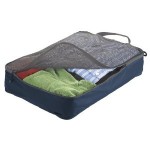 SeatoSummit garment bag
SeatoSummit garment bag
I only pack one backpack when I travel, which means my hiking boots, emergency snacks, and underwear float around in one big compartment. Not cool. SeatoSummit garment bags changed all that. I tried them out on a trip to Portland and was able to keep my clothing clean, folded, organized, and away from my dirty shoes and clementine oranges.
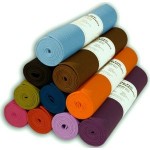 Yoga Mat
Yoga Mat
A yoga mat is my one essential non-essential when I travel. I’ve used it as a makeshift bed in Paraguay and for actual downward dog stretching in Cabo, San Francisco, and Belize. To transport the mat most effectively, I roll it very tight, secure the top with a rubber band, and insert the bottom into the exterior pocket of my backpack designed for a water bottle.
Read MoreWhat I Love About Being a Freelance Travel Writer
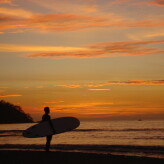
Like other freelance writers, I’ve always felt a slight feeling of nausea at the thought of working a nine-to-five job. Every day I wake up and go to my desk knowing that my creativity and articulation are the only things paying the bills. Although it can be a little frightening – especially during tax time – I find it exhilarating to watch the day unfold on my own terms. If a story isn’t making sense on paper, I just go for a hike or take a stroll to a local café and try again. If, at three AM, I get a great idea for a story, I send a quick e-mail to an editor and wake up the next morning to a brand new assignment.
Perhaps the biggest perk of being a travel writer is the license for guilt-free adventure. Whether it’s dancing with a local señorita or performing “detective work” at a neighborhood pub, being a travel writer gives you permission to experience each destination to its fullest. Contrary to popular belief, readers can sense when a writer is padding a story or using fluff clichés. I’ve heard more than one editor remark about tossing stories in the waste bin as soon as they see stock phrases such as “quaint”, “nestled”, or “resembling cardboard cutouts”. In other words: you have to truly experience the place you’re writing about if you want to write a good story.
As a freelance travel writer, your job is to find new places and tell new stories in a way that stains the reader’s imagination and makes them long to go where you’ve gone. I love this. It’s why I get out of bed in the morning. And because it’s nearly impossible to write an accurate, engaging story without experience, it forces me to get my head out of the guidebook and pay attention.
Which brings me to another reason why I love freelance travel writing. More than any other type of journalism, travel writing actually requires you to have a good time. I once tried to write a story about a weekend trip I spent in Dublin on the way to a writer’s conference. Due to logistical issues, I found myself constantly on the phone with conference staff and had no time for exploring the city. I was so preoccupied that I barely had a sip of Guinness in the airport before boarding my flight to Mali. Later, when I tried to write about my trip to Dublin, all I could summon were descriptions on how dreary the rain was.
One of my favorite trends in travel journalism is the recent boom in “experience tourism”. More and more readers are wanting stories about places that engage them both physically and mentally, with activities like ecotourism, volunteer work, and immersion. Instead of playing the role of tourist bystander, modern travelers are yearning to become important to the places they go. For me, this means even more opportunities to break the surface and connect with different people and their cultures. My favorite example of this is a week I spent volunteering at a work camp in Aix-en-Provence, France, that involved piecing together old Roman walls that had been buried for five centuries. After a day’s work everyone would reconvene on the patio for a bottle of du vin rouge while sharing our stories around a small fire pit. In addition to learning hands-on skills in masonry and excavation, my French vocabulary doubled, and I made some lasting friendships with the locals and other volunteers.
Thanks to conferences such as the annual New York Times Travel Show, travel writers can now talk directly with representatives of the tourism boards for different countries. Since practically every country profits from tourism, most travel shows have representatives just waiting to accommodate writers who can tell their story. One of my favorite aspects of travel writing is taking assignments from developing countries located in Africa, South America, Asia, or Eastern Europe. Since most readers are unfamiliar with these countries, you start to feel like you’re in unchartered territory. Why?
Because every travel writer and their cousin has written some blurb about cafés in Paris or coffeehouses in Amsterdam. But I don’t know anyone who’s written about, say, competing in an axe-throwing tournament in the Scottish Highlands, or witnessing a 2,000-year old shamanic ritual on an island in Lake Baikal, Russia. As a travel writer, you get paid to find that unique place or story and fully experience it with all your body.
And then comes the writing. With all of the allure and adventure of the job, it’s easy to forget that travel is only half of the job title. Being a travel writer means spending hundreds of hours crafting paragraphs and searching for the right words. It means sitting at your desk and revising stacks of pages for synapse and imagery, trying to find the best way to tell your stories. Fortunately, most successful travel writers have a passion for writing, and tend to find the act of filling pages to be as exhilarating as the traveling itself.
Of all the perks of the travel writer’s life, the writing is undoubtedly my favorite. It makes you see places and people in a different light, and keeps you searching for new ways to express yourself. As Natalie Goldberg famously said, writers live twice: experiencing each place one time in the flesh and another time on paper. I can’t imagine a better way to live.

